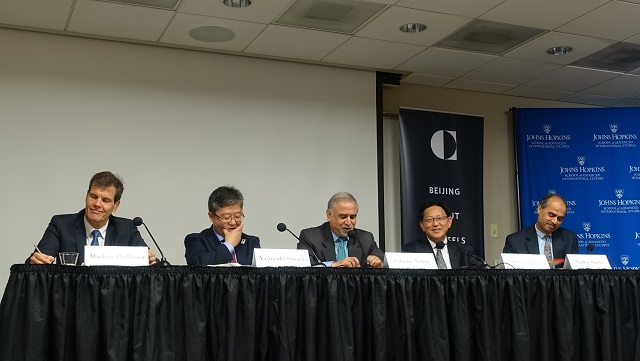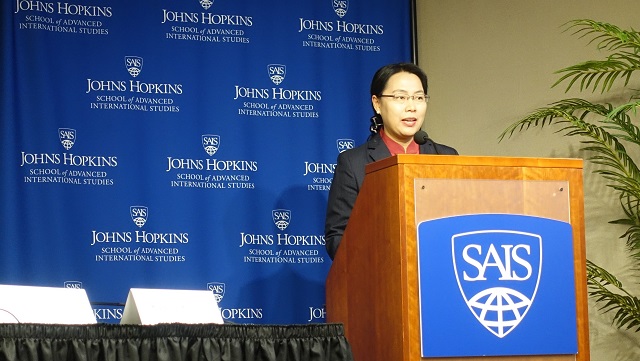
Distinguished discussion panel at the seminar on “Twenty Years after the Asian Financial Crisis” in Washington, D.C., on October 12, 2017. From left to right: Dr Markus Rodlauer, Deputy Director of the Asia Department in the International Monetary Fund; Dr Yasuyuki Sawada, Chief Economist for the Asian Development Bank; Professor Vikram Nehru, distinguished practitioner-in-residence at Johns Hopkins University School of Advanced International Studies; Dr Hoe Ee Khor, Chief Economist of the ASEAN+3 Macroeconomic Research Office; and Dr Sudhir Shetty, Chief Economist for the East Asia and Pacific Region of the World Bank.
Washington, D.C., USA, October 12, 2017 – Asian economies have taken the lessons of the Asian Financial Crisis twenty years ago to heart, by strengthening their macroeconomic fundamentals and policy frameworks, and enhancing regional financial cooperation, as highlighted by eminent economists at a seminar held today in Washington DC, USA.
With the theme “Twenty Years after the Asian Financial Crisis”, the seminar was co-hosted by the ASEAN+3 Macroeconomic Research Office (AMRO), Johns Hopkins University School of Advanced International Studies, and the Carnegie Endowment for International Peace.
“The Asian Financial Crisis in 1997 was a landmark event in our region’s history that shook up conventional wisdom of how a crisis can start and spread, and offered long-lasting lessons in crisis management,” said AMRO Director Dr Junhong Chang in her opening remarks. “It propelled regional financial cooperation and pushed economies in the region to strengthen their macroeconomic fundamentals and to build up buffers.”

ARMO Director Dr Junhong Chang delivers the welcome remarks at the seminar on “Twenty years after the Asian Financial Crisis” in Washington, D.C., on October 12, 2017.
In his presentation, AMRO Chief Economist Dr Hoe Ee Khor outlined the fundamental policy adjustments that ASEAN+3 economies have made in the past two decades. The stronger foundations and better macroeconomic management enabled the region to weather the Global Financial Crisis relatively unscathed.
The lessons from the Asian Financial Crisis are particularly valuable with challenges that cloud the current global economic outlook, including the risk of rising trade protectionism, tightening global financial conditions and heightened financial volatility. Looking ahead, policymakers are encouraged to prioritize financial stability, in the balance between growth and financial stability. While foreign exchange reserve buffers in the region remain ample, policy space has shrunk, and the global policy environment has become more uncertain.
The presentation was followed by a panel discussion of prominent experts with considerable experience in Asia comprising Dr Hoe Ee Khor, AMRO Chief Economist; Dr Yasuyuki Sawada, Chief Economist for the Asian Development Bank; Dr Sudhir Shetty, Chief Economist for the East Asia and Pacific Region of the World Bank; and Dr Markus Rodlauer, Deputy Director of the Asia Department in the International Monetary Fund. The discussion was moderated by Professor Vikram Nehru, distinguished practitioner-in-residence at Johns Hopkins University School of Advanced International Studies.
The panel agreed that the lessons from Asian Financial Crisis remain relevant today, especially in the current uncertain global environment. Economies in the region should focus policy attention on risks from financial markets and capital outflows while highlighting the speed and impact of contagion among economies. While noting that policymakers have put in place more flexible and responsive policy frameworks to deal with external shocks, the discussants recognized the importance of greater regional financial cooperation in coping financial contagion.
